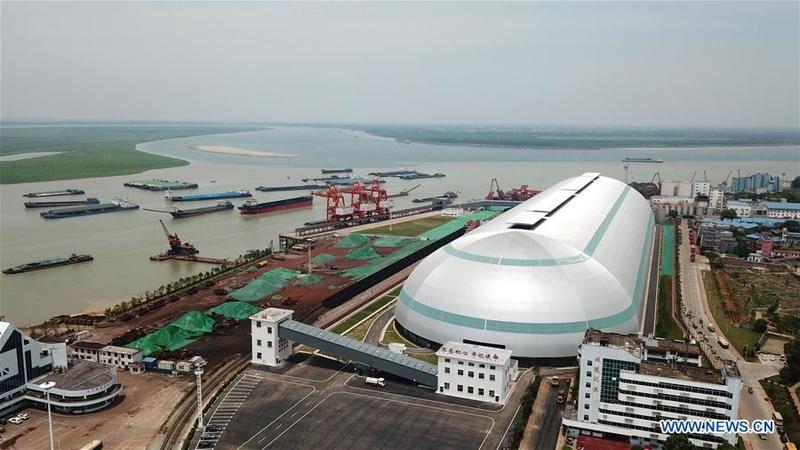 This aerial photo taken on April 25, 2020 shows a capsule-shaped bulk cargo warehouse at Chenglingji Port in Yueyang, central China's Hunan province. (CHEN ZHENHAI / XINHUA)
This aerial photo taken on April 25, 2020 shows a capsule-shaped bulk cargo warehouse at Chenglingji Port in Yueyang, central China's Hunan province. (CHEN ZHENHAI / XINHUA)
CHANGSHA-Living near the Chenglingji Port on the bank of the Yangtze River, Tu Liang said he had seldom opened his windows before.
"Keeping the windows closed could help us keep out the overwhelming dust," Tu said.
Standing at the juncture of the Dongting Lake and the Yangtze River, the port Tu mentioned in Hunan province has remained an important goods distribution center for land-water and water-water transfer in the middle reaches of the Yangtze since its official launch in 1899, making large contributions to the development of the local economy.
However, there is another side to this story. Over the past decades, outdated facilities, rolling dust and filthy waters turned residents off and ate away at the port's economic potential.
With shore power facilities, highly efficient energy-saving systems, 18,000 square meters of new turf and 1,230 newly planted trees along the Yangtze, the new port of Chenglingji looks more like a park than a port
"Coal and iron ore used to be piled up on the dock without cover, and sewage flowed everywhere after it rained. Coming back from the dock, I would throw my shoes away," said Nie Zhiqiang, who has lived near the port for about half a century.
A beacon of hope came in 2016 when the development of the Yangtze River entered a new era, ushering in a green and efficient transformation of the century-old port that once faced the possibility of overall relocation.
ALSO READ: Yangtze delta integration plan unveiled
That year, local authorities invested more than 18 million yuan (US$2.54 million) for the renovation and upgrade of the sewage treatment system in Chenglingji's international container terminal-a place often called the new port of Chenglingji-that could produce 100 to 120 metric tons of sanitary sewage daily and a large amount of wastewater from the cleaning of mineral containers.
Since the renovation, the treated sewage is now being recycled, with some flowing into a clear water tank where more than a dozen goldfish are kept.
Meanwhile, environmental protection companies have been introduced to the recycling of the sorted garbage on the new port. Docked ships are required to obtain a "garbage receipt "before they can undergo further clearance procedures.
With shore power facilities, highly efficient energy-saving systems, 18,000 square meters of new turf and 1,230 newly planted trees along the Yangtze, the site looks more like a park than a port.
READ MORE: Scientist wants Yangtze body
On Saturday, a capsule-shaped bulk cargo warehouse was officially put into use, marking another major step in the introduction of more eco-friendly and high-quality riverside development.
With a colossal warehouse that measures 470 meters long, 110 meters wide and 46.5 meters high, cargo on ships can be transported directly into the warehouse through a conveyor belt before being either piled up or loaded onto a train, said Wang Wenhua, director of the Chenglingji New Port Administrative Committee.
The whole process will be completely shut off from the surroundings, and continuous mist spray inside the warehouse will help prevent the buildup of dust and water pollution that previously occurred at the port's freight yard, thus aiding the protection of the Yangtze's ecological environment, Wang added.
"With more advanced equipment and a better environment, changes to the port have gone far beyond our imagination," Nie Zhiqiang said.


